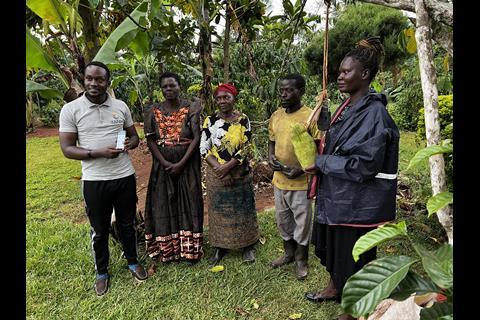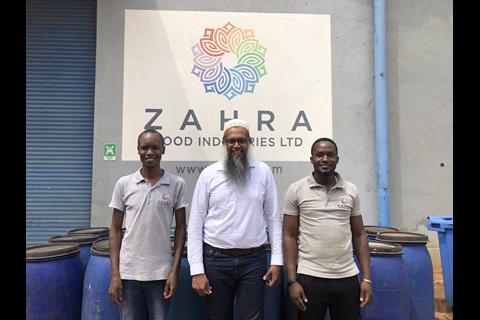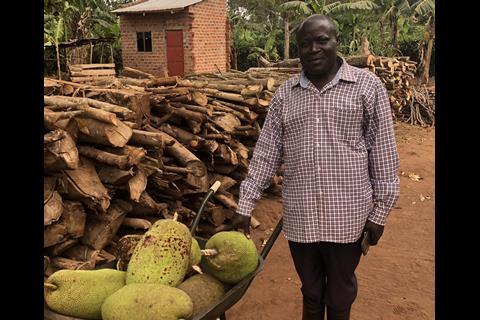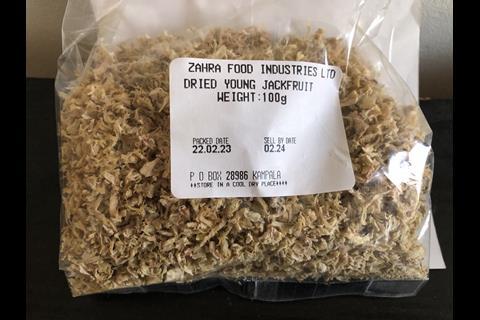Fred Searle visits Zahra Food Industries in Uganda as the up-and-coming jackfruit supplier begins to unlock the financial potential of the country’s ‘ancestral’ trees
In many ways jackfruit is a funny old fruit. This spiky tropical colossus is the largest tree fruit in the world, weighing up to 45kg and measuring as much as 100cm long. It has a distinctive, musky smell and an unusual flavour – said to be like a combination of apples, pineapples, mangoes, and bananas. It is one of the few fruits that is high in B vitamins. And once cut and dissected, its chunks resemble prepared artichoke hearts in their mild flavour, colour, and flower-like appearance.
To fresh produce afficionados, these are all interesting and unusual qualities, but in the West, the way in which jackfruit is prepared and eaten means that most consumers are totally unaware of most of its distinguishing features. What people know it for in Europe and the US is its stringy, meat-like texture. And it is this particular aspect of the fruit that has made it so popular as a meat substitute – for use in a wide range of vegan dishes and value-added products.
Pulled jackfruit, jackfruit burgers, jackfruit curry, jackfruit samosas, BBQ jackfruit, teriyaki jackfruit – these are just some of the inventive ways the fruit is now consumed by European consumers. And as the trend for meat reduction continues, demand shows no sign of slowing.
Jackfruit is grown in greatest volume in India, Bangladesh, Thailand, and Indonesia. And the fruit is used extensively in South and Southeast Asian cuisines. From various countries such as Thailand and Sri Lanka, a growing volume is now shipped to Europe, generally in canned form. But one business doing things differently is Ugandan processor Zahra Food Industries, which specialises in dried jackfruit and exports to food manufacturers in the Netherlands. The business started venturing into jackfruit supply 18 months ago.
Once processed, the finished product is airfreighted to Dutch manufacturers and turned into burgers and meatball-esque jackfruit balls, for sale in retailers such as Albert Heijn. But as production expands, Zahra wants to reach additional markets, particularly the UK, the US, and France.
Jackfruit production in Uganda is far less commercialised than in some Asian countries, but that is not to say it isn’t widespread. The fruit is grown across almost all regions of Uganda and, on average, each farmstead in the country has 3-5 jackfruit trees – to help feed that particular family and its livestock. Historically, the Buganda Kingdom, which represents Uganda’s largest ethnic group, has encouraged its subjects to plant jackfruit trees as a source of food they can always fall back on.
But now Zahra is trying to help these Ugandan farmers unlock the economic potential of their jackfruit trees by offering them a route to export. The company’s strategy is to source small volumes of fruit from smallholder farmers – currently 300 of them – in the regions surrounding its processing facility in Kampala. And rather than encouraging farmers to plant new trees, the focus is on making the most of the many ‘ancestral’ trees already in the ground. Some of these trees are up to 50 years old.
“There isn’t a single commercial jackfruit farm in the country,” says the company’s CEO Quresh Fidahusein. “In some communities in Uganda there’s a bit of a taboo against commercially engaging in activities to do with the fruit, since there’s a mindset that jackfruit is your own food and not to be sold. But we’re trying to change that and make people realise that selling it can actually bring their families much more.”
Last year, Zahra Food Industries harvested around 140 tonnes of jackfruit, which translated to an average income of approximately $100 per farmer. This has allowed some families to increase their annual income by 20 per cent, according to Fidahusein.
The task of training growers in remote rural locations with very little prior experience of commercial agriculture is not always easy. But Zahra Foods has a team of so-called ‘extension workers’ to assist growers with various tasks, not least plant husbandry and harvesting the fruit at exactly the right moment to ensure it is perfect for processing.
Since Uganda already has widespread – if disparate and fragmented – jackfruit production, supply has not been an issue. But ensuring the correct quality has been a challenge. Zahra’s quality control managers encourage the growers to improve their agronomy practices and track their yield, fruit weight, skin colour and other data using the company’s grower app.
“Farmers upload their data offline, and then I check the dashboard to see what has been done in the field and what needs to be corrected and recommunicated to the farmer,” explains Museke Yekoyada, who heads up Zahra’s quality control team.
One of the cooperative’s farmers is Kintu Mwanje, who has been growing jackfruit since 1973 when he inherited his father’s four-acre farm. He lovingly calls it Fruit Forest. Located in the village of Bukujju, 40 miles northeast of Kampala, the farm produces jackfruit, coffee and apple bananas. This year, Mwanje wants to increase his jackfruit production from 42 to 100 trees.
“After a visit to my grandfather’s place, I came back with some jackfruit seeds,” recalls Mwanje. “I got motivated because my village was growing. I thought, let me plant for the future. Now, with jackfruit being used for [plant-based] meat, I’m looking forward to growing more of the fruit because it is a big market.”
Through research, trial and error, Fidahusein has worked out that only young jackfruit – harvested after roughly six weeks on the tree – is well suited for drying and gives consumers the ‘meaty mouthfeel’ that is considered the holy grail for meat substitute manufacturers. The dried jackfruit expands in volume by eight times when rehydrated and has the environmental and commercial advantage of taking up less space and weight when shipped dry.
Zahra currently exports 6-12 tonnes of dried jackfruit a year, but with major investment on the way this could increase to over 100 tonnes in the next few years. “We’re at a very advanced stage of getting an investor in, and we’re scaling up to 20 times more than the volumes we’re currently producing,” says Fidahusein, preferring not to name the potential partner.
Given the nature of the end product, this supply chain will remain largely invisible to the end consumer. But the social benefits of Zahra’s sourcing model are beyond question. And demand for dried jackfruit looks set to grow as the trend for plant-based eating continues.
Adding value
Zahra also processes and packs a range of dried fruits and nuts. The products, which include mango, pineapple, banana, papaya and macadamia, are sold by premium retailers in Uganda and exported regionally and to the EU. The packs’ creative and unusual names include ‘sassy pineapple’ and ‘snobby papaya’.
More than a snack
In a separate project, Zahra has partnered with the Japan International Cooperation Agency (JICA) in Uganda to source ingredients for cereal bars from the country’s refugee communities. The aim is to improve refugees’ livelihoods in a sustainable way while raising awareness of refugee issues globally. Ultimately, Zahra wants to find an export market for the cereal bars. Uganda hosts 1.5 million refugees, the third-highest total in the world.







